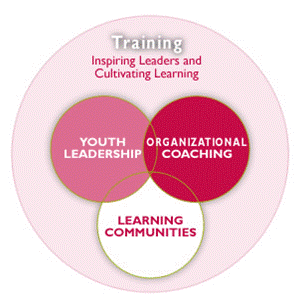 Summary of YDN Trainings
Summary of YDN TrainingsFacilitation 101: Examines staff’s role as facilitator versus teacher; learn how to set up group norms in a participatory way; learn about group development and how to create community; learn positive ways to get good behavior; examine ways to engage youth in the classroom.
Facilitation 202: Learn about multiple learning modalities and how to incorporate them into classroom settings; learn a process for collaborative project planning so that teams can stay on track; learn tools to develop a learning community and trust in a group, and to resolve issues that get in the way of a strong learning community
Diversity training: Examines what is meant by diversity, examines oppression and power and how that impacts youth; examine adultism and other isms and what their impact on youth; explore personal beliefs around diversity; learn ways to create caring environments for youth that acknowledge youth culture, build trust and empower youth to overcome diversity challenges they face in their lives.
High Powered Learning/Study Skills: Using research-based methods, this training teaches ways to improve memory, how to understand and use learning styles to the student’s advantage, and note taking skills—this training would teach skills that adults can then transfer to youth.
Peer Programs General Intro: Class covers how to set up peer programs, defines peer programs, defines the kind of support and training needed for peer programs to be successful, and examines various peer program models.
Outcomes and Indicators/Evaluation Methods: Learn basic terminology, develop outcomes and indicators for your programs using a youth development framework; and examine various ways to measure the indicators and collect data, especially data from youth about their experiences. Look at ways to engage youth in data collection.
Management Styles that Support YD and Supportive Supervision Strategies: How can supervisors and organizations support staff in implementing youth development approaches, by creating organizational environments that model youth development principles? What kind of management styles and organizational environments support youth development practices? What skills do youth workers, supervisors and organizations need to be successful in moving forward a youth development approach? What are some quick tips to create safe and engaging environments for our staff? This workshop helps answer these questions.
Conflict Mediation: Learn practical skills that you can teach youth to reduce and mediate conflicts within the classroom, school or program (active listening, paraphrasing, I messages, triggers, etc.). Examine conflict mediation models, including peer conflict mediation programs.
Youth Participation 101: Examine Youth/Adult partnerships, benefits and challenges to YD partnerships, and the continuum of youth participation. Define adultism and examine your beliefs around youth and youth engagement. Explore strategies to engage youth and also look at what needs to be in place organizationally to support youth engagement.
Organizational Assessments: Examine youth development practices that need to be in place in a classroom or organization using the youth development framework for practice. Do an assessment of your organization and classroom, and then develop a plan to make changes. This class provides several assessment tools and also a process for reviewing practices and making an action plan.
Youth as Civic Activists: This more advanced youth participation class looks at different models of youth civic engagement; specifically, how to set up a youth council or advisory group, steps to having youth do community research, and strategies around supporting youth to become involved in advocacy and community change work/ social justice.
Youth Culture/Adolescent Development: Look at adolescent developmental stages, brain development and what we know youth need to succeed. Examine youth culture and what that means for how adults work with youth.
Community and Youth Asset 101 Training: Participants will learn what is meant by community and Youth assets. Participants will learn how to map community assets and will brainstorm ways to use those local assets to support youth and their programs. The class will examine what it means to create partnerships and what are the key aspects of a strong partnership. Tools to help map resources and create partnerships will be provided.
Project Based Learning/Service Learning Projects/Community Service: Depending on the request, this training will emphasize either project-based learning or service learning. Both processes are very similar, with a somewhat different emphasis. Participants will look at the service learning/PBL research, understand the continuum of community service, service learning and how it relates to civic engagement and social activism. Learn the process/steps for having youth develop and complete services learning/community service/PBL projects. Examine ways to integrate curriculum and arts into service learning projects and look at rubrics to measure impacts of the experience.
Setting up Peer Mentoring Programs: After the basic class on peer programs, this class speaks specifically to what needs to be in place to set up cross-age mentoring programs, mentor/mentee recruitment, training of students, operational issues, and monitoring.
Peer Education Programs: After the basic class on peer programs, this class speaks specifically to what need to be in place to set up peer education programs. Review different models and learn skills that are needed to implement and train youth to be peer educators. Examines pitfalls, challenges you may face in running these programs and brainstorms solutions.
Youth Development 101 (2 day training): This training examines asset, youth development and resiliency research; explores the shift in beliefs that are needed to move forward with this approach, and helps participants begin to examine how they can integrate this work into their programs or agencies. The training focuses on strategies for implementing the 5 Supports and Opportunities of the youth development framework for practice.
Summary of YDN Trainings for Youth
High Powered Learning/Study Skills: Using research-based methods, this training teaches ways to improve memory, how to understand and use learning styles, and note taking skills.
Peer Educators: Learn basic skills for being a peer educator
Peer Mediators: Learn basic skills for being a peer mediator
Change Agents (2 day training): Topics covered include understanding oppression and power, having a vision for change, examining your role as facilitator and leader, learning about historical change agents, examining what it means to be a change agent versus a change stopper, and examining what it means to be an organizer. Participants will learn about some of the tools organizers use: methods to identify an issue, how to do outreach, speaking to people in power, getting your message out and across, how to be effective in making a pitch for your ideas in front of a policy body, various ways to advocate for your position and ideas, and using SMART goals to help organize an event or a work plan towards action.
Basic Tools for Youth Advisory Board Members (2 day training): Examine the youth‘s role as a trustee and facilitator versus leader. Develop skills around listening, consensus building, goal setting, project planning and monitoring, group agreements, facilitation.


